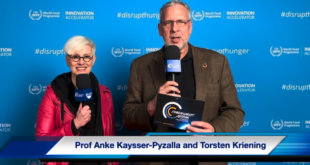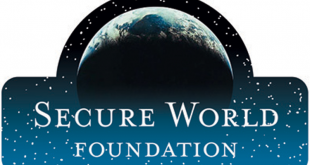By Dr. Michael K. Simpson
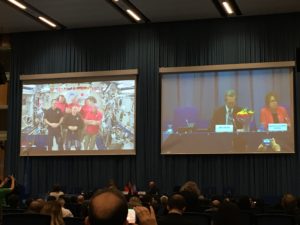
The good, the bad, the great, and the ugly were all on display as the United Nations community gathered in Vienna last month to celebrate the 50th anniversary of the first UN space policy conference.
Dubbed UNISPACE+50, the celebration commemorated UNISPACE I, a conference that had also been assembled in Vienna in 1968, 11 months before the first moon landing. Among its accomplishments were the decision that the UN should provide increased support for capacity building in space applications and that the needs of developing countries should not be ignored. That progress has been made in augmenting the participation of developing countries in the use of space is marked by two statistics. The total attendance of UN member states at UNISPACE I was 78 countries. This year the membership of the UN Committee on the Peaceful Uses of Outer Space alone is 87 countries and that is scheduled to rise if the UN General Assembly (UNGA) approves as is expected the addition of the 6 new members COPUOS has proposed this year.
The UNISPACE+50 events began with panel sessions on Monday and Tuesday that reflected the progress made by the space sector in the years since UNISPACE I. With four panels covering exciting developments in the impact of space for Industries, Youth, Civil Society and Women, a largely uplifting message of cooperation, progress, and synergy was softened only by acknowledgement that more remains to be done to integrate these communities into the mainstream of space activity. It was nonetheless widely noted that for the first time in history, the 2018 edition of UNISPACE was chaired by a woman, Rosa Maria Ramirez De Arellano y Haro of Mexico who also became the first woman to chair a General Session of COPUOS. All of this contributed to the “good,” referred to above.
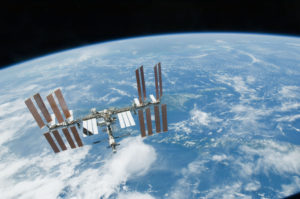
On Wednesday morning, the formal sessions of the high-level segment of UNISPACE+50 was convened. Its primary goal was the adoption of a unanimous resolution acknowledging past progress, pointing to the future agenda, and declaring a firm link between the advancement of space capabilities and the Sustainable Development Goals (SDGs) adopted by the UN in 2013 scheduled for achievement by 2030. There was some disappointment that completion of the Space 2030 Agenda that many had hoped would emerge as an operable plan from UNISPACE+50 was deferred to 2020. Perhaps the good news here is that the responsibility for completing that plan has been allotted to the UN General Assembly (UNGA) where all UN member states are represented and can provide input even if we can expect that COPUOS will have the lead role in developing draft text.
It also became clear at UNISPACE+50 that the series of high-level forums of the type that had helped prepare the conference would be continued as a mechanism for a wide cross section of governments, commercial parties, non-governmental organizations and others to provide input into the Space2030 process. This, when coupled with the participation of over 90 countries and numerous representatives of non- governmental entities may be one of the great new visions of the future of space activity. In this vision, the rules continue to be made by countries, but the opportunity for input from a broad array of constituencies increases substantially. This is a very important development for the commercial space community since unlike COPUOS, the HLF sessions have been fully open to representatives from space businesses.
After two very successful HLF sessions in 2016 and 2017 hosted in Dubai, the HLF venue will shift to Bonn, Germany this year. The dates are 13-16 November 2018 at the UN Offices there. Details are available on the website of the UN Office for Outer Space Affairs: http://www.unoosa.org/oosa/en/ourwork/hlf/2018/hlf-bonn-Announcement.html and applications to participate are available online as well at https://register.unoosa.org/civicrm/event/register?id=107&reset=1. Remember to scroll down to section F, print out, complete, and scan a pdf of the signature page before filling in the rest of the form since you will need a copy to attach at the end and cannot save a partially completed copy.
If there is one overarching theme that emerged from the many statements delivered during the High Level Segment of UNISPACE+50, it is that the Space 2030 Agenda will need to demonstrate that it includes substantial support for achieving the Sustainable Development Goals, which are also scheduled to face an assessment in 2030. Many government speakers and a significant number of the observer representatives made this point in their presentations.
Cynda Collins Arsenault, founder of COPUOS Permanent Observer Secure World Foundation, made this point particularly well, saying, ”As with most privately funded Foundations, ours began not only with a dream but also with a vision. We wanted the number of people world-wide who truly felt secure in their daily lives to grow. We wanted fear of hunger, disease, abuse, violence, natural disaster, and inequality to disappear as much as possible. In many ways we envisioned a world where what we now know as the Sustainable Development Goals could be met.”
Ultimately, the four days devoted to UNISPACE+50 and its preceding Symposium ended on a strongly optimistic note. The six subsequent days devoted to the regular meeting of COPUOS were more mixed.
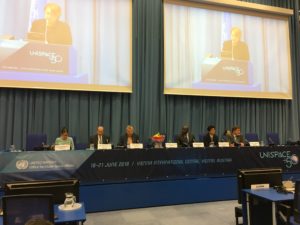
One the one hand, the achievement of consensus on 21 guidelines for assuring the long-term sustainability of space activity (LTSSA) has a chance of one day being recognized as a great milestone in in achieving cooperative, shared decision making about what we increasingly realize are limited resources. On the darker side, arguments over observer status requests, disagreements over the leadership of the working group responsible for advancing a text for the Space2030 agenda, and uncertainty about how proposals for LTSSA guidelines that had not yet achieved consensus would be considered in the future led to long and occasionally somewhat bitter, maybe even ugly, exchanges. Clearly geopolitics was at work here, but so, too, was something with the potential of transforming the international discussion of space policy.
With the membership of COPUOS now poised to exceed 90 members, there is no longer any doubt that space activity is a matter of concern to a very large number of countries not to mention a growing community of non-state actors seeking to observe the committee’s work and assist as they are able.
The debate over observer status focused on North Korea, but hallway conversations buzzed with questions about whether treating any General Assembly member with space capability as a pariah was in the best interest of creating international space policy. The intense discussion over leadership of the Space 2030 working group reflected a strongly-held objective of many emerging, space-capable states represented in the Group of 77 to play a leading role in setting the multilateral policy agenda for space. Even the discussion about continuing to discuss unresolved issues surrounding the LTSSA guidelines showed a desire that no ideas be abandoned due to lack of time and that the guidelines that had been adopted not be allowed to become stale with time because the guideline work was considered finished.
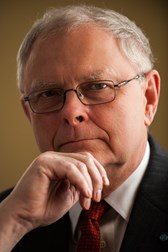
For those interested in reading a little history, documents related to the session can be found online at: http://www.unoosa.org/oosa/en/ourwork/copuos/2018/index.html.
For those interested in helping to make history, I refer you back to the discussion above of the opportunity to attend the next HLF in Bonn this coming November. I hope to hear your thoughts there.
Dr. Michael K. Simpson is the Executive Director of the Secure World Foundation. SpaceWatch.Global is proud to be supported by Secure World Foundation.



